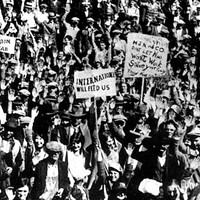Sanitation workers get dirty end of the deal
Overworked, underpaid for DNC — but law not on their side
By Ana McKenzieSantee Jones looked tired as he picketed last Monday's City Council meeting. The 32-year-old sanitation worker had spent Sunday night collecting trash, and he would return to work once the meeting ended.
As thousands of delegates, journalists and politicians party day and night this week, sanitation workers like Jones are putting in mandatory 12-hour shifts, eight days straight from Aug. 31 to Sept. 8. While police received a $50 million federal grant to beef up manpower and equipment for the Democratic National Convention, the same number of solid-waste workers, including trash collectors, who normally cover Charlotte have had to double their regular workweek to 84 hours. When they're not working, they're required to be on call.
Dozens of solid-waste, sanitation and utilities workers showed up outside city council meetings in August, asking for a livable wage, the opportunity to discuss policy changes and grievances with department heads and for union representation throughout the grievance process. But until decades-old state laws are reversed, they're fighting a losing battle.
North Carolina banned collective bargaining in 1959, forbidding public-sector employees from negotiating contracts that set everything from wages to hours with their employers. The state's right-to-work law, often mentioned in the same breath as the collective bargaining ban, gives public-sector workers the option to join unions but prohibits them from paying dues, weakening the few that are here. With the two laws in place, public-sector employees are often underrepresented and overworked.
The deep-seated resentment toward labor movements and unions in North Carolina began in the '20s, when the textile industry was king in the Carolinas. Mills thrived in the hands of erstwhile farmers accustomed to sunup-to-sundown labor. That is, until the industry-wide economic downturn of the 1920s, when mill owners began laying off workers. Any who remained had to pick up the slack. Grassroots movements and unions encouraged laborers to strike, the most storied of which took place on April 1, 1929, just 30 minutes south of Charlotte at the Loray Mill in Gastonia. More than 1,800 workers refused to return to their jobs until demands for better pay and shorter hours were met. The state sent hundreds of National Guardsmen, who, alongside mill bosses and their police henchmen, responded with brute force.
Though Loray and other strikes happening simultaneously across the South shoved workplace inequality into the national spotlight and paved the way for things like minimum wage and mandatory work breaks, they also cemented Dixie's anti-union stance. When South Carolina Gov. Nikki Haley spoke to the Republican National Convention last week, she made sure to attribute economic development in her state to "non-union" workers.
Santee Jones is compensated for overtime work, but even coupled with regular pay it isn't enough to support his wife and two sons. This week, he'll have to change the sleep schedule he's had for years, resting at night instead of the day. But pay and rest aren't what frustrate him and other city workers most. As one put it to council members last week: "Charlotte is one of the cleanest cities in America, and yet [sanitation workers] don't feel appreciated."
However, they shouldn't blame the city for the situation. In the decades since right-to-work and collective-bargaining laws have been in place, neither Democrat nor Republican state legislators have seriously attempted to reverse them. But workers can't really blame politicians either.
They can only blame those of us who continue to vote the same politicians into office, year after year.
Speaking of...
Latest in Brave News World
More by Ana McKenzie
Calendar
-

Wine & Paint @ Blackfinn Ameripub- Ballantyne
-

Queen Charlotte Fair @ Route 29 Pavilion
-

NEW WINDOW GALLERY-Pat Rhea-ACRYLIC PAINTINGS-April 05-30 2024 VALDESE, NC 28690 @ New Window Gallery/Play It Again Records
- Through April 30, 12 p.m.
-

TheDiscountCodes
-

Face to Face Foundation Gala @ The Revelry North End
-
Esports in Charlotte Takes Off: A Guide to Virtual Competitions and Betting
-
Canuck in the Queen City 7
A Canadian transplant looks back at her first year as a Charlotte resident
-
Homer's night on the town 41
If you drank a shot with the Knights mascot on Sept. 20, you were basically harboring a fugitive















